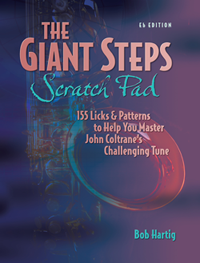Bebop is to jazz what Baroque harmony is to classical music. Both became the “common practice” of their genre, foundations on which the entire body of music that was to follow would stand. Even seemingly unrelated musical expressions, such as Schoenberg’s atonalism or Miles’s modalism, were creative attempts to break free from what had gone before, and as such are vitally linked to the common practice of their genre.
This is why I’ve concentrated quite a bit on developing my bebop capabilities–not that I’ve by any means mastered bop, but I get around in it fairly well, well enough to hold my own in most settings. My philosophy has been that a good foundation in the common practice of jazz, bebop, will equip me to handle a broad range of other music besides. The premise is simple: metaphorically speaking, if I own a car that can top out at one hundred thirty miles an hour, I know it will handle seventy, no sweat.
The harmonic sophistication and technical demands of bop lead to the development of a respectable musical toolkit. The melodic language is nearly as universal as the blues; a lot of it is in fact dipped in the blues, and works with reasonable success in blues bands.
There is one challenge I face, though, that stems from saturating myself in a particular style. It’s hard to break out of the box and think in a different mode. I have to remind myself to lay back, take it easy, and not default to frenetic double-timing when I’m playing some up-tempo piece with the Grand River Blue Cats. That approach doesn”t fit, or rather, it fits when used sparingly. Ditto with smooth jazz. I am not a smooth jazz player–not that I can”t handle it, but it’s not my area of concentration. Smooth jazz is a highly nuanced music. A lot of it isn”t particularly challenging technically, but that doesn”t mean it’s simple stuff. You have to think in a smooth idiom, and in order to do that, you have to listen to a lot of the stuff. And to be honest, when I”m getting set to plunk down my fifteen bucks for a CD, I naturally gravitate to something a little more hardball. Jackie McLean. Mike Brecker. Cannonball. Eric Marienthal. That’s just my musical instinct, and maybe I need to broaden it.
But that being said, while I”m no music educator, I’ve heard it said more than once that a lot of young players are sidestepping the roots. That”s too bad. Bebop may not be what everyone listens to these days, but it remains the foundation, the source of much contemporary musical language. Studying it–really getting inside it and working at it–pays off. The best players know that”s true.

